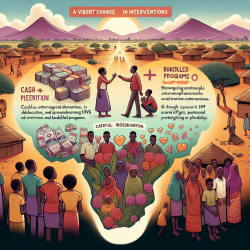The fight against HIV in Africa has taken a transformative turn with the introduction of cash plus and bundled interventions targeting adolescents. A recent systematic review sheds light on the potential of these strategies to reduce HIV risk by addressing economic vulnerabilities and enhancing health capabilities.
The Power of Bundled Interventions
The research article titled "Systematic review of cash plus or bundled interventions targeting adolescents in Africa to reduce HIV risk" highlights the effectiveness of combining economic strengthening with health education. The study reviewed 58 studies, including 43 quantitative and 15 qualitative studies, evaluating 26 unique interventions across Eastern and Southern Africa.
Key Findings
- Economic Outcomes: The majority of interventions showed significant improvements in economic outcomes, such as increased savings and financial literacy.
- Mental Health: Positive impacts were observed on mental health and psychosocial well-being, with reductions in depressive symptoms and increased self-esteem.
- HIV Prevention Knowledge: Nine out of ten studies found protective effects on HIV prevention knowledge, indicating increased awareness and testing among participants.
- Sexual and Reproductive Health: Interventions improved knowledge and utilization of sexual and reproductive health services.
Challenges and Opportunities
The study also highlighted areas needing improvement. Limited impacts were observed in reducing HIV incidence/prevalence, changing gender attitudes, and preventing gender-based violence. These outcomes require more complex interventions that engage communities at multiple levels.
The findings suggest that while economic strengthening is crucial, it must be complemented by efforts to address social norms and gender inequalities. Practitioners should consider integrating these components into existing programs to enhance their effectiveness.
The Path Forward
This research underscores the importance of multisectoral approaches in HIV prevention. Practitioners are encouraged to delve deeper into this field to identify best practices and adapt them to local contexts. By doing so, they can contribute to more effective strategies that empower adolescents and reduce their vulnerability to HIV.










